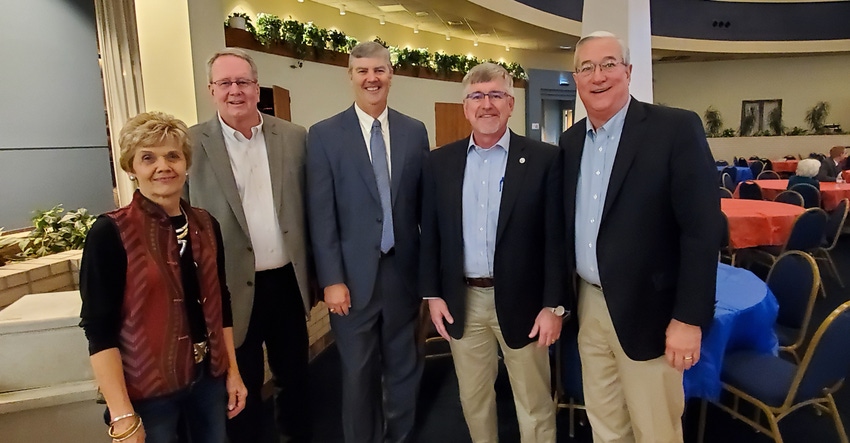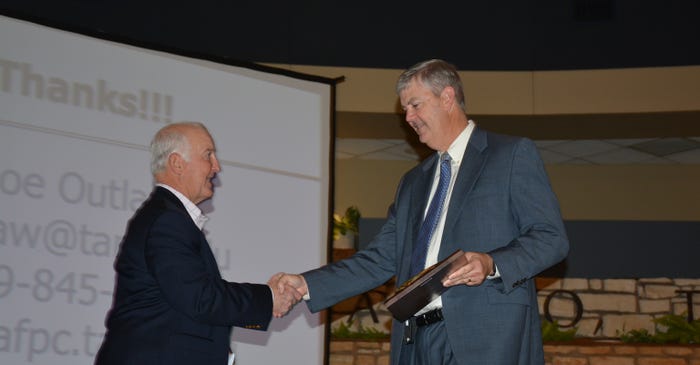
Joe Outlaw, professor and Extension economist and co-director of the Texas A&M Agriculture Food Policy Center (AFPC), was named the 2019 Wheat Man of the Year by the Texas Wheat Producers Board and Association, Dec. 4, at the Texas Wheat Symposium, Amarillo, Texas.
"Joe's been a friend of agricultural for years," says Texas Wheat Producers President Jody Bellah. "He does a lot of hard work for all the different commodities in agriculture."

Joe Outlaw is also a friend to wheat, he adds. "Joe's just always available. And I know our staff and board members can — as can any farmer in the nation —call and get a hold of Joe or his staff and get help. He's always available and does a great job at Texas A&M. We just wanted to honor him and hope we have many years of service left from him."
Texas Wheat Producers Board and Association executive vice president Rodney Mosier calls Outlaw a dedicated advocate for Texas farmers, who has built a history of service through his leadership with the AFPC and the Texas Ag Forum. "His influence on farm policy has benefitted Texas farmers for decades and his work is appreciated by farmers across the state. We are fortunate to have a leading expert on farm policy working in our state and on our behalf across the country."
Prior to receiving his award, Outlaw gave a farm policy update and discussed "where things will move in the future" for agriculture. He opened his presentation with, "You must be a trusting group. Most people who have heard me talk before know this, but it's probably not going to be the most uplifting presentation today."
While Outlaw may not always say what people want to hear, Bellah says, "he certainly tells us what we need to hear."
Farm Bill Service
Outlaw's involvement with the farm bill dates to 1985 when, as a student, he began working for AFPC gathering educational materials for the 1985 bill. He has worked on facets of the 1990, 1996, 2002, 2008, 2014 and 2018 farm bills and received many honors, including the National Excellence Award in 2015 from the Extension Committee on Organization and Policy and the National Institute of Food and Agriculture, USDA.
See, The U.S. is competitive in the wheat export market
"So, to get Man of the Year from Texas Wheat is a big deal to me. These are important things to people like me, even though I do a zillion presentations, these are the ones that mean the most."
Thinking Outside the Box
As Outlaw presented the 2020 outlook, he assured the crowd, "Things change over time. If we get positive results with China, conclusions to that dispute, then things will change again. But as of right now, since 2013, things have been on a downward path and now we're at flat prices. When you have flat prices, if they're above your cost of production, that's okay. But we have flat prices below the cost of production for all the major crops we produce in Texas, and that puts a lot of stress on producers."
Under the circumstances, growers are going to have to think outside the box, he says. "Throughout the marketing year, following harvests, producers will have opportunities to do some things through the futures market where they may get a better price than just selling it off the combine. Those are some of the things we are going to have to think about during this flat price period."
See video, Joe Outlaw named Wheat Man of the Year
During the 1980s, when prices were flat, Outlaw says, "You didn't have to be very good to do my job. The price of corn was $2, plus or minus 10 cents ever year. People still grew it. Why? Because that was the average. Throughout the marketing year, the price could bump up a little bit and then you could actually do something to lock in a higher price. That's what I'm saying, producers need to start thinking about that."
If a grower doesn't like the crop price offered, he can convert, for example, corn to feed and feed out cattle at a feed yard. "If the price is too low, and you can't make money selling it to the elevator, maybe you could make money selling it through beef. We're going to have to consider things like this and think outside the box."
About the Author(s)
You May Also Like






